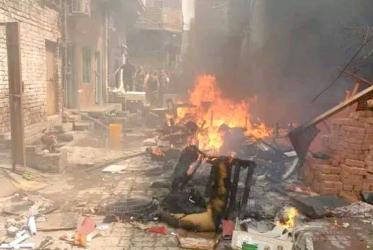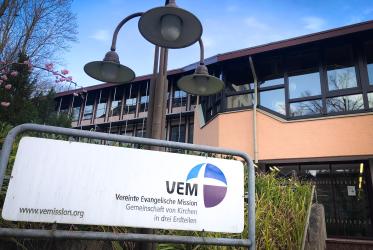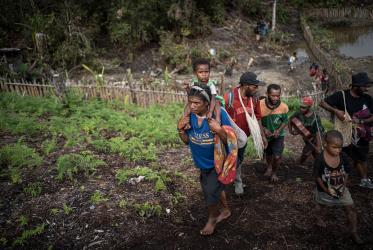Adopted by the Central Committee, Geneva, 26 August - 3 September 2002.
The Central Committee expresses its deep appreciation for the report it has received on the extensive efforts undertaken by the Executive Committee, the General Secretary and the staff of the Council in response to the terrorist attacks on the USA on 11 September 2001. It endorses the brief message sent to the US churches by the General Secretary on behalf of the Executive Committee that was in session in Geneva on that day, and his subsequent pastoral letter to them of 20 September. As the letter of 11 September said: "We pray especially for the victims of these tragedies and for their families and loved ones
We fervently pray that this is the end of terror, and implore those responsible to desist from any further such acts of inhumanity." Those prayers continue.
By the sending of a "living letters" pastoral delegation to the churches in the USA, the Council embodied the outpouring of solidarity and sympathy - and also the forebodings - of churches and related councils around the world. As the team expressed, "we have come out of our wounded contexts to share with you in your woundedness. We have been moved to humility and encouraged to hear church leaders battling with questions that are broader than their own concerns, that take in the larger context of the world." US churches have been encouraged and uplifted by the expressions of support and sympathy from every corner of the globe, including from those who have experienced the devastating effects of terrorism and war.
In adopting this minute, the Central Committee recognizes that it has been just one year since the attacks, that the wounds are still deep and that the resulting and pervasive sense of vulnerability remains in the people of the United States and people elsewhere. We also recognize that these attacks were orchestrated by a well-financed and dispersed terrorist network. Further, we recognize that many members of the US churches are still engaged in the spiritual struggle to resolve the tension between a heightened patriotism evoked by these attacks against US symbols and citizens on the one hand and a renewed spirituality that calls for them to embrace unfamiliar vulnerability and to reflect on the moral complexities of these events on the other.
The US churches responded and continue to respond to grief, to broken communities and to the shock of unfamiliar vulnerability. Many US churches have spoken publicly about the negative consequences of their government's response to the terrorist attacks. At its November 2001 Assembly, the National Council of the Churches of Christ in the USA (NCCCUSA) stated "We believe that the tragedy of the September 11th attacks and the ensuing war on terrorism
provide a kairos moment, a place within God's time - a time for the Church to bear witness to the fullness of God, our creator, redeemer and comforter." In that statement, NCCCUSA also expressed grave concern about the violation of human rights and the civil liberties of those being detained by the US government and expressed a concern that the US government work with the community of nations in responding to the threat of terrorism and working for justice and peace. But the space for open public discussion of the current US response to terrorism is limited and critics are often portrayed as disloyal and unpatriotic.
The US military response to the attacks led the WCC to take a series of clear and appropriate public issues actions. Through Behind the News: Voices of Faith, Visions of Hope, produced jointly with Action by Churches Together (ACT) and the Ecumenical Advocacy Alliance, the Council provided essential information and analysis that was not otherwise generally available, helping member communions and others to better understand developments. The two "discernment" consultations convened in Geneva (November 2001) and Washington, D.C. (August 2002) by the Commission of the Churches on International Affairs have helped churches around the world to think through the issues and challenges and to begin to develop their responses in a concerted way.
The background paper on Public Issues prepared for this meeting by the International Relations staff seeks to provide a cogent analysis of the implications of the US government's response to the events of 11 September. In solidarity with those who suffer in the USA and around the world because of the events since 11 September, we share the following concerns in hope and prayer for a more just and peaceful world:
1. The impact on international peace and security. The US government has responded to the events of 11 September through military means and has pressed all the nations of the world to align themselves with US policies by threatening serious repercussions if they do not. This "war on terrorism" has reinforced the concept of military "solutions" to complex issues, thus giving licence for the continuation and escalation of civil wars and other armed conflicts, including the Israel-Palestine conflict. Further, governments in all regions have used the "war on terrorism" to justify repression of political dissent. By dividing the world into the "good and the evil", US leadership has encouraged dangerously simplistic approaches to complex realities. The churches have a particular responsibility to resist oversimplification of complex realities.
2. The impact on human rights and international law. In its response to the attacks, the US government has implemented a series of measures which threaten human rights and civil liberties in both the United States and elsewhere. The US government has demanded decisive measures by other nations to adopt legislation and practices that mirror those of the US. In doing so, the USA has contributed to the adoption of policies in many countries reminiscent of the 1970s and 1980s when repressive military governments applied the doctrine of "national security" through declarations of states of emergency that set aside constitutional protections for human rights and civil liberties. Both the immediate and long-term implications of this are deeply troubling and challenge Christians to continue to speak and to support strong human rights standards which churches themselves have had a preeminent role in developing.
Similarly, the US government has indicated on many occasions that it will bypass the United Nations. By so doing, and by its opposition to the newly established International Criminal Court, the USA has seriously undercut international law and standards. It has thus put in severe jeopardy efforts of more than half a century to establish a just world order. The churches' own long-standing commitment to the development of international law and cooperation is at stake.
3. The practice of unilateralism. The determination of the US government to act alone wherever it deems necessary, and to claim for itself immunity both under the UN Charter and its own treaty obligations sows the seeds of serious international confrontations in the future. It has already abrogated several treaty obligations entered into by previous Administrations, several of them ratified by the US Congress (for example the Anti-Ballistic Missile Treaty and the Comprehensive Test Ban Treaty). In UN gatherings before and since 11 September, the US has often stood virtually alone against the world on matters ranging from disarmament to environmental policies to racism. This too is troubling. As participants in the August 2002 Washington meeting said in their message to the WCC Central Committee, "peaceful relations among nations and peoples are achieved through multilateral decision-making, not by the unilateral economic and military actions of one country".
4. The global rise of militarism and new military doctrines. Already before 11 September, the USA had strengthened its own military presence around the world. This presence has been growing since 11 September so that it is reported that US military forces are today stationed in more than 100 countries. Beyond this extension of its global military reach, the Bush administration advocates unilateral pre-emptive military strikes in response to perceived threats to US security. This runs counter to the UN Charter and creates a pattern that could seriously undermine international security. This implied equation of security with military force is in stark contrast to the commitment of churches to human security, which can be achieved only through economic justice, peace, and respect for human rights and international law.
As the world faces the real and ongoing threat of terrorism, we reaffirm that the most effective ways of combating terrorism are to be found in building a more just world order in which the rights and dignity of all human beings are upheld and affirmed. Powerful as it is - politically, economically and militarily - the USA is only one nation within the world community. It is earnestly hoped that the US government will again work with other nations to strengthen the framework of world order that it was itself instrumental in shaping at the Founding Conference of the United Nations in San Francisco.
The churches of all nations have a critical moral and ethical responsibility to speak truth to power. The fulfillment of this responsibility requires thoughtful discussion of these issues and prayerful discernment of Christian responses. Within the framework of the Decade to Overcome Violence, the churches are challenged to promote reconciliation and healing, to intensify efforts at inter-faith dialogue, and to strengthen their relations with each other in responding to this new and dangerous world order. We are called to address these issues taking account of Christ's words to his disciples:
You have heard that it was said, "You shall love your neighbour and hate your enemy." But I say to you, Love your enemies and pray for those who persecute you, so that you may be children of your Father in heaven; for he makes his sun rise on the evil and on the good, and sends rain on the righteous and on the unrighteous. Matt. 5:43-45





